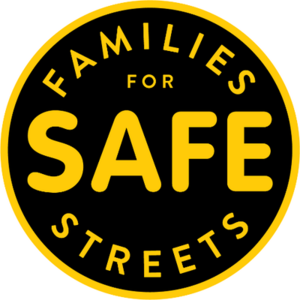Families for Safe Streets: We Support the Fight for Racial Justice
Statement from Families for Safe Streets Chapters Nationwide:
"Families for Safe Streets believes that America’s legacy of subjugation and shameful oppression against Black Americans specifically, and other Indigenous and people of color more generally, is shameful. This painful legacy lives on to this day in the form of institutional injustice that permeates nearly every aspect of our society. We have buried our children, siblings, parents and spouses or suffered serious injuries due to traffic crashes across the United States. We pour our pain into purpose and confront the epidemic of traffic violence in this country to prevent others from sharing this suffering.
And so our hearts ache to hear George Floyd’s cry for his mother. This cry was agonizing in an all too familiar way for many members of our organization. While our pain is in a different context and we can never fully “understand,” we too know the anguish of loss and trauma. Therefore, we feel particularly compelled in this moment to speak out against the injustice of racism and police violence in our nation. We acknowledge our own failings and blind spots, particularly around traffic enforcement, and we are acting on it. We recognize that our efforts to prevent suffering may have inadvertently caused Black Americans and communities of color to suffer and we will fight for such harmful measures no more.
Today we not only stand with those who fight for racial justice, but we also recognize how our work in support of safe streets intersects with the problems of institutional racism and police violence that the Black Lives Matter movement is currently challenging. We hear the call for a less harmful way forward and urge a complete reimagining of street safety solutions.
Institutional racism pervades our streets. This racial injustice impacts which communities receive traffic safety improvements and which drivers police choose to stop. Black Americans are more likely to be killed in traffic crashes and by police during routine or unjustified traffic stops. Communities of color often suffer disproportionately from heavy traffic because of racist urban planning choices, leaving these communities to suffer from adverse health effects at much higher rates, including asthma, reduced lung function, and more.
It is imperative that all communities benefit from the life-saving efforts to eliminate traffic fatalities on our roadways. It is also equally essential that ending the preventable epidemic of traffic violence does not inadvertently harm people of color.
As such, we not only pledge our support to the fight for racial justice, we also vehemently pledge to do no harm in our advocacy.
Specifically, we call for the following changes to stop the racial disparity in ending the epidemic of traffic violence:
Traffic Enforcement
We need to reimagine ways to keep us safe that don’t necessarily involve traditional law enforcement. We start with traffic enforcement in this statement because it has been the most harmful to Black Americans and communities of color. We recognize our part in espousing traffic enforcement by police officers and call for a complete reimagining and reprioritization of traffic enforcement across the country.
Far too often, the police do not make our streets, roads and sidewalks safer. Far too often, the police cause harm instead.
Instead, state, county and municipal traditional traffic enforcement must be the responsibility of unarmed officers and the task must be reassigned from police departments to departments of transportation, public works or a comparable entity.
Automated enforcement should be a key tenet of any traffic enforcement program to avoid racial profiling by police officers, and it is why it has been a focal point of our enforcement advocacy to date. Speeding, failure to yield, distracted driving, running red lights can all be enforced equitably with technology instead of armed police officers.
However, we also recognize that these programs have at times been poorly administered in ways that harm communities of color. We vow to fight for effective, equitable implementation and administration so as to not cause harm. All automated enforcement programs must have modest fees ($50 or less), sliding scale options, and/or driver safety programming in lieu of fees. Camera placement must be both effective and equitable. All automated enforcement funds must be directed to putting in place long-term solutions to end the epidemic of traffic violence and/or supporting those personally impacted.
As our cities and counties open streets during this pandemic to allow for social distancing, it is imperative that these efforts be done without any police enforcement.
Finally, it is imperative that enforcement attain its proper place in the priorities of eliminating fatalities on our roadways. It is significantly less effective than taking a comprehensive safe systems approach and has the potential to cause much harm.
Safe Systems Approach
We urge cities and states across the country to prioritize speed management and a safe systems approach as the key tenet to Vision Zero because it is more effective at deterring dangerous driving than enforcement and is less likely to be a tool for racial injustice.
Current police traffic enforcement funds should be redirected to lowering speed limits, redesigning roadways and improving public transit – with a particular focus on and in partnership with communities of color which have not received these life-saving measures.
Vision Zero Task Forces
We urge localities to create Vision Zero Task Forces comprised not only of traffic safety experts, but also of people personally impacted by the epidemic, with particular inclusion of communities of color, who have historically suffered from discriminatory and inequitable traffic safety solutions.
Silence is violence. We speak out and demand action."
Families for Safe Streets (FSS) confronts the epidemic of traffic violence by advocating for life-saving changes and providing support to those who have been impacted by crashes. Comprised of individuals who have been injured or lost loved ones, FSS was founded in 2014 in New York City and is now growing as a national movement with chapters forming across the country.

